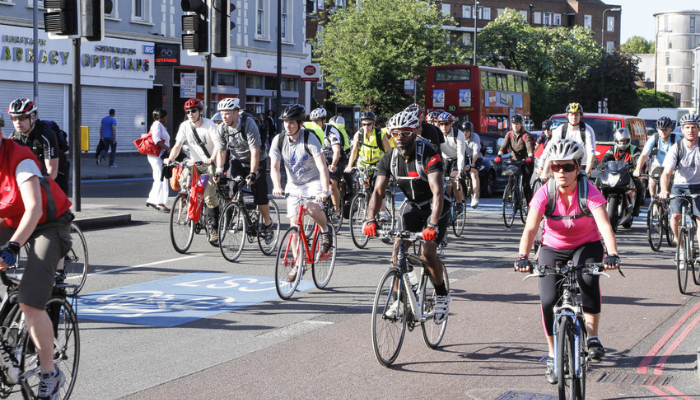Transport - what's the problem?
Published: 22 Nov 2021

Transport in Wales was responsible for 17% of all Welsh climate emissions in 2019 (page 79). The majority of emissions come from road transport and in particular cars. In fact transport in Wales is dominated by the car more than in any other part of the UK.
Climate scientists are warning that we also have to make substantial changes to our travel behaviour, driving less and flying less. And we have left it so late that steady incremental changes to our travel will not be enough.
In the Welsh policy context, it is clear that achieving the wellbeing goals enshrined in the Well-being of Future Generations (Wales) Act 2015 cannot be achieved without tackling transport as the rogue sector that is performing worst in reducing climate damaging emissions.
Learning from other countries
The universal, comprehensive public transport that we must now create needs to be like the public transport networks in the city-regions of Munich, Vienna and Zurich. In these areas public transport functions as a single system. Buses, trams and underground and suburban trains are coordinated by public transport governing bodies or Verkehrsverbünde (VV) to provide “one network, one timetable, one ticket” (Transforming public transport).
Levels of public transport use in the VVs are strikingly higher and it can be estimated that, if similar levels of public transport use to those in Munich, Vienna and Zurich city-regions were to be achieved in these Welsh and English urban areas, then car mileage in those areas would be cut by over 9%. This would get us a significant way towards meeting the minimum reduction in car mileage of 20% that is needed to tackle climate change.
Modal shift
The changes needed to cut greenhouse gas emissions from transport would also help to reduce problems like air pollution and obesity. They’d make our cities and towns more liveable – for people and nature.
It’s not enough to simply change to electric vehicles. We need a modal shift - to get cars off the road and enable people to travel by public transport and active travel. Friends of the Earth estimates we need to reduce traffic by 60% by 2030 in order to reach climate change goals.
In 2021/22, Welsh Government has invested £70 million in walking and cycling through its Active Travel Fund, with additional investment coming in following years. It is also proposing a default 20mph speed limit in residential areas.
These are big steps forward but with more and more people rediscovering their bikes and with the urgent need to address the transport sectors’ contribution to climate chaos as well as air pollution, we need a major overhaul of the Welsh transport sector.
Aviation
We also need to take action on aviation. In 2019 it currently accounts for around 7% of the UKs transport climate emissions (page 6) and is one of the most carbon intensive of all transport forms and one of the most difficult to decarbonise. If it goes unchecked, it could end up being the largest contributor to UK greenhouse gas emissions by 2050.
In Wales, the Welsh Government owns Cardiff Wales airport and also subsidises the north-south airlink between Anglesey and Cardiff. Figures show that this north-south air link costed Welsh tax payers £136 per passenger in 2017-18. The North-South airlink subsidy has now been scrapped!
A Friends of the Earth study shows that the number of flights will need to be reduced by at least 18% by 2030 in the UK if we are to meet our net zero emissions target.
With the pressing need to act on climate chaos, continuing to financially support a niche and polluting mode of travel doesn’t make sense.
